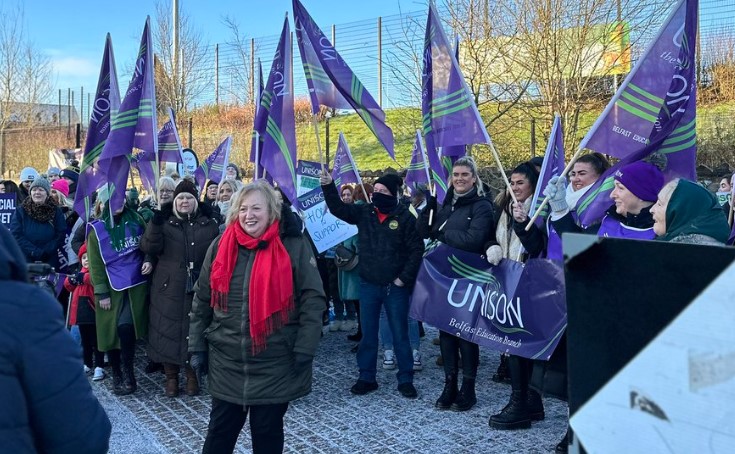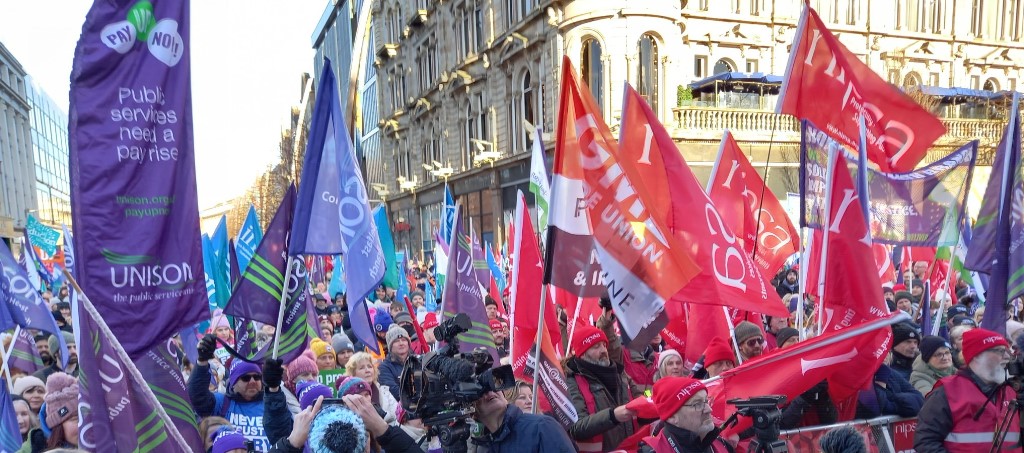By John Pickard
Today’s was the biggest strike in recent Northern Irish history, involving 150,000 workers, belonging to sixteen different trade unions, mostly in the public sector. Most bus and train services came to a standstill. Schools were closed and there was widespread disruption to local authority services and the NHS.
Tens of thousands of workers, with their banners and flags flying, marched from several different locations, including two Belfast hospitals, to converge on City Hall in the centre of Belfast, where there was a mass rally addressed by trade union leaders. Rallies also took place in Derry, Omagh and Enniskillen.
This hugely impressive day of action is testimony to the real anger that is felt by workers in Northern Ireland as their pay continues to erode against the increasing cost of living. Northern Irish trade unions are demanding that the UK government release funds for pay awards, despite the absence of a functioning NI Assembly.
A new attempt to kick-start the Assembly by electing a speaker fell apart yesterday, because of the instransigence and refusal to participate by the DUP. It is disgraceful that the UK government has offered £584mn to resolve ongoing pay issues, but only on the condition that the Stormont Assembly begins to function again. Public sector workers are paying a heavy price as Westminster’s bargaining chip.
DUP are happy to have a sea border for public sector pay
Mark McTaggart, of the Northern Ireland teachers’ union, INTO, told the rally in Belfast, that Jeffrey Donaldson, the leader of the DUP, “has spent nearly two years outside Stormont refusing to let the executive sit because of his concerns over a sea border. Yet he is more than happy to have a sea border for pay for public sector workers”.
Justin McCamphill from the NASUWT, who is also President of the Irish Congress of Trade Unions, added his weight to the call for NI politicians to return to the Assembly. “It is time that somebody knocked their heads together”, he said, “and got them to get back to their places of work…The Tories have taken our money, the DUP should not take our hope.”
Some of the workers on strike took their protests directly to the Belfast office of the Tory minister responsible for Northern Ireland, Chris Heaton-Harris, although behind the glass doors there were no sightings of the man himself. Nonetheless, outside, Carmel Gates, General Secretary of the civil service union NIPSA, was loudly cheered when she told the workers that “We’re here to embarrass Chris Heaton-Harris”
Another NIPSA official, Patrick Mulholland, also spoke to striking workers in Belfast, outside the headquarters of the Northern Ireland Office. “Today, Northern Ireland’s public services are frozen by a general strike”, he said, “we are sending a message that enough is enough.”

“We, the trade union movement, are taking on the issue of people dying because they are on waiting lists, we are taking on the issue of children in our schools being hungry because of the cuts. We are taking on the issue of the disintegration of the social fabric of our society and we show no fear.” (see report in Belfast Telegraph)
He also added that the strike “is only the beginning. If we do not get social and economic justice, the struggle will continue. Today a public sector general strike, tomorrow everybody general strike”.
“I don’t remember any party promising to impoverish the people of NI”
The mass rally in Belfast was addressed by the assistant General Secretary of the Irish Congress of Trade Union, Gerry Murphy who called on the UK government to abandon its “failed political strategy” and allow a proper pay rise to public Northern Ireland sector workers.
The Belfast Telegraph reported on some of the other rallies in Northern Ireland, such as the one in Omagh, where an working classroom assistant told strikers that public sector workers were suffering “economic sanctions” and that they must end. Another NIPSA official, Jane Scott, told the same rally that they were “making history for Northern Ireland”, in the “biggest strike that Northern Ireland has ever seen…Tomorrow we are back to work, back to being public servants that are underfunded, underpaid and overworked”.
One of the speakers at the Belfast rally,Patricia McKeown, regional secretary at UNISON, put her finger, perhaps unwittingly, on the problem of politics in Northern Ireland. “I don’t remember when we went to the polls last time,” she said, “any political party standing on a platform which said we will impoverish the people of Northern Ireland, we will wreck equal pay for public sector workers, we will run down the National Health Service, we will neglect our schools and social care system, our public services…None of them I remember got a mandate for that but it happened anyway”.
Unlike the workplace, politics in NI is sectarian-based
These comments were absolutely on the button, although they were not taken to their logical conclusion. This strike, and the rallies around it, are an indication of the real potential power of the workers’ movement in Northern Ireland.
It is the same trade unions that were on strike today, as well as their brothers and sisters in the private sector, who hold the key to non-sectarian politics in Northern Ireland. The strike and these speeches were all in stark contrast to the sectarianism that still pervades politics, where most parties are wholly or largely sectarian-based, including the two largest, Sinn Fein and the DUP.
The DUP is a party whose entire political strategy revolves around stoking up fears within the Protestant community about links with Dublin and the ‘danger’ of looser ties with Britain. Likewise, despite the appearance of Sinn Fein’s Michelle O’Neill on a picket line, her party is seen by Protestant workers as a purely Catholic and Nationalist party, and nothing she has said or done has contradicted that.
Neither of the main political parties offer anything remotely like a class approach to working class problems. Yet thebig majority of the workers on strike today are in workplaces where Catholic and Protestant workers work side by side and where there is no animosity or sectarian ill-feeling.
It is a situation crying out for a labour-based political party that would raises the most important issues that affect working families – pay, housing, services, the NHS – on class and not sectarian terms. The same trade union leaders who led today’s strike and addressed mass rallies so well, therefore, have an added responsibility – because no-one else can do it – to advance the idea of a non-sectarian party of labour to address the issues that working class people face.



